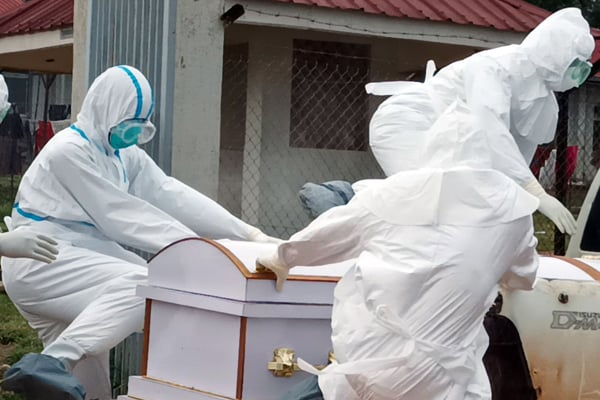Scientists moot plan to reduce Ebola deaths

The Mubende burial team loads a casket containing a body of an Ebola victim onto a pick-up truck last month. PHOTO/FILE
What you need to know:
- The report states that during the outbreak of Ebola Virus Disease (EVD) last September, the plans for deploying some of these experimental products failed due to a lengthy approval process.
Government scientists have recommended the need to have pre-approved research protocols to quicken the testing of experimental drugs and vaccines which could save lives during outbreak of diseases like Ebola.
This recommendation is contained in a newly published report in a scientific journal, Nature Medicine. The lead author is Dr Henry Kyobe, an epidemiologist at the Health Ministry, who coordinated the Ebola response in the recent outbreak as the incident commander.
The report states that during the outbreak of Ebola Virus Disease (EVD) last September, the plans for deploying some of these experimental products failed due to a lengthy approval process.
55 of the 142 confirmed cases died in Uganda
“…the government of Uganda engaged international partners and pharmaceutical companies to ensure the production and availability of vaccines and monoclonal antibodies with demonstrated efficacy against the Sudan virus (which caused EVD outbreak),” part of the report reads.
Clinical trials
The report continues: “Nevertheless, clinical trials and deployment of some of these experimental therapeutics and vaccines did not occur because the outbreak ended during the approval and preparation phase.”
The EVD therapeutics and vaccines developed over the past 10 years against the Zaire strain had been used in recent epidemics in DR Congo, where they reduced epidemic duration and case numbers. However, the report states that interventions were not effective against the Sudan virus which was behind the September 2022 outbreak.
“In the future, having pre-approved research protocols could enable rapid rollout of clinical trials and other pertinent research during an epidemic, and enhance the effective mitigation of its impact,” the authors recommended.
Authors
The report authors also included Dr Misaki Wayengera, the head of scientific advisory committee; Dr Diana Atwine, the Permanent Secretary of the Health Ministry; Health minister Dr Jane Ruth Aceng and other public health leaders. The report was published on June 23.
Amid this challenge of failing to deploy experimental vaccine, the authors noted, the government managed to successfully control the epidemic within 113 days, without locking down the capital city. But there were lockdowns in other affected districts like Kassanda and Mubende that were at the heart of the outbreak.
The authors said the government was “guided by two factors: lessons from the COVID-19 pandemic, and recent successes in responding to EVD epidemics in DR Congo”.
.




